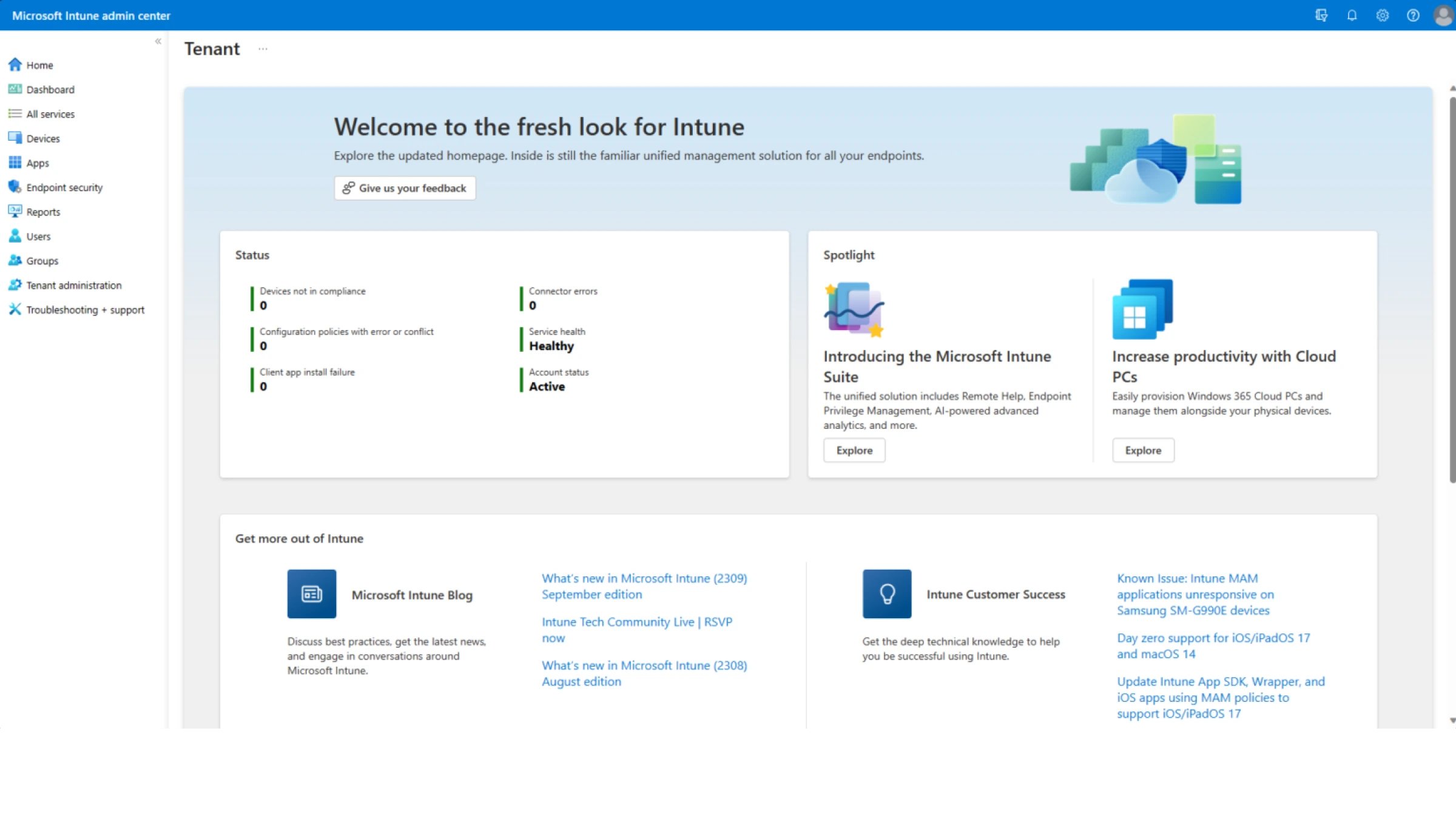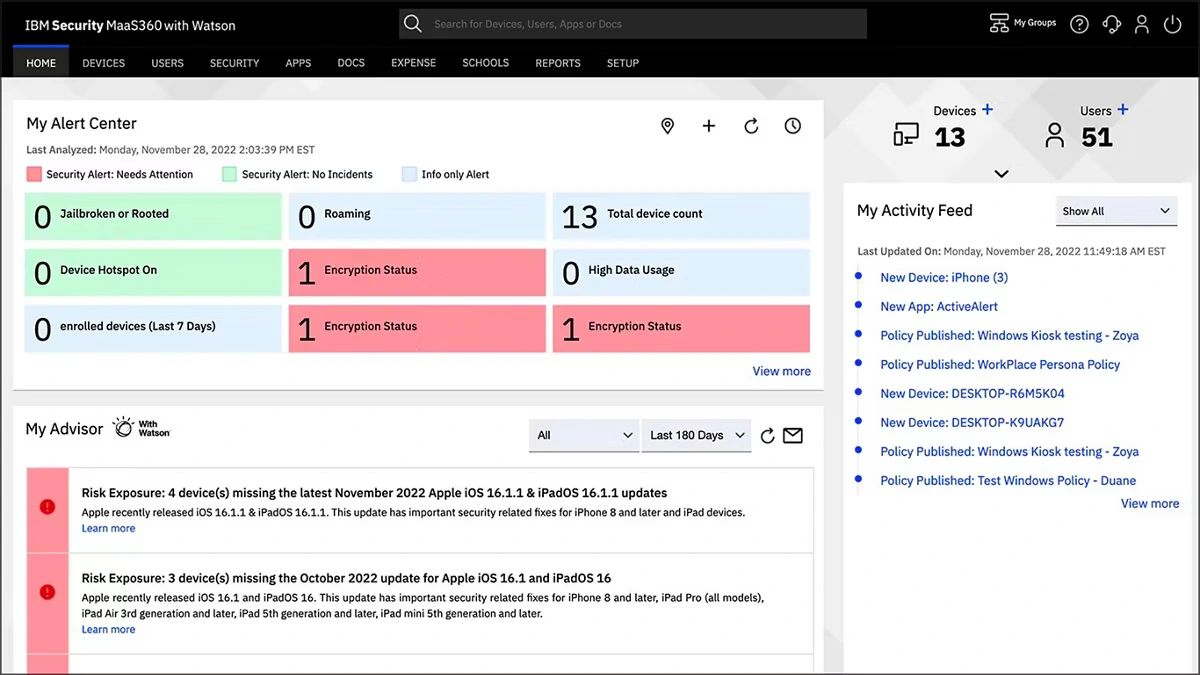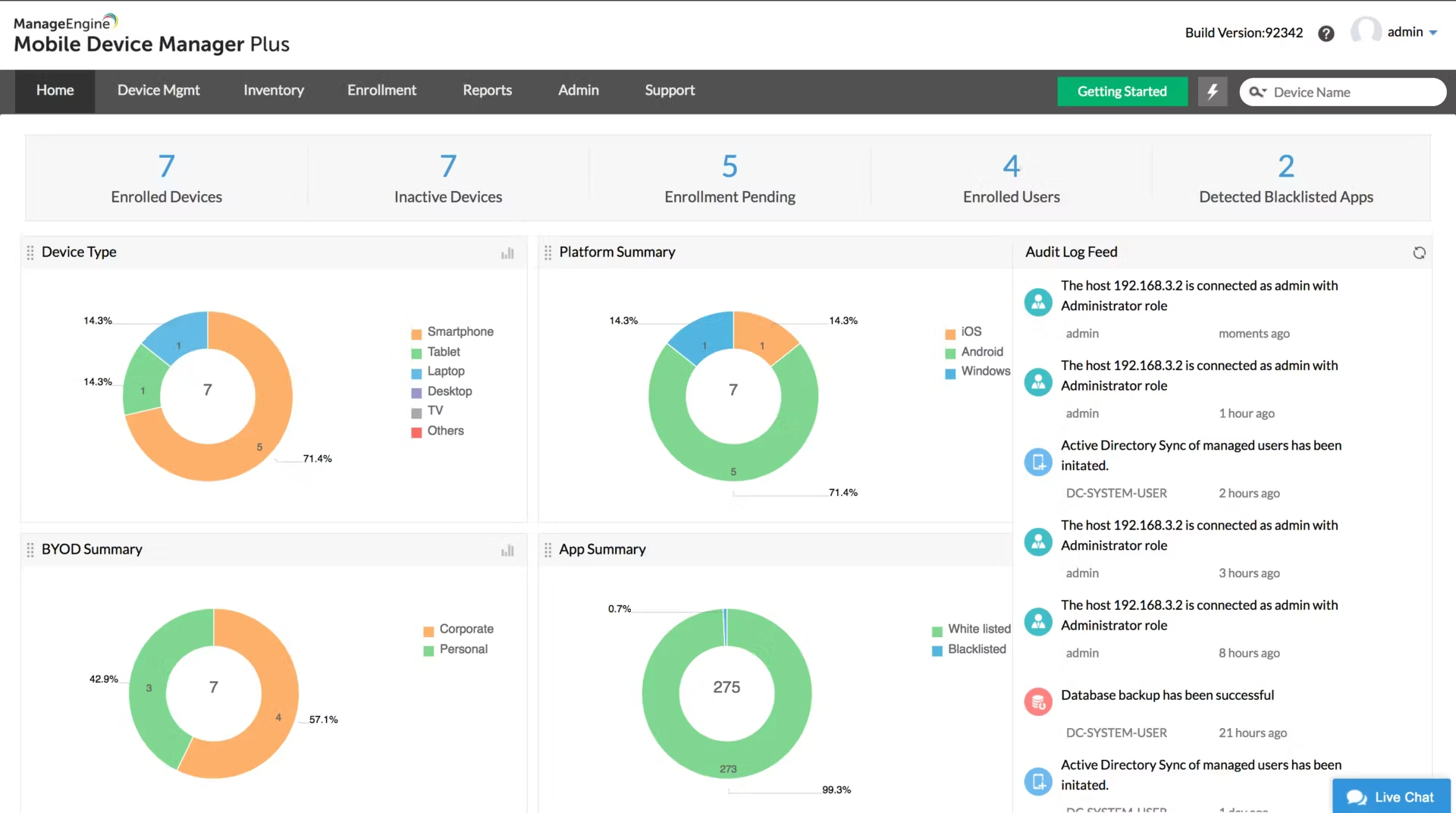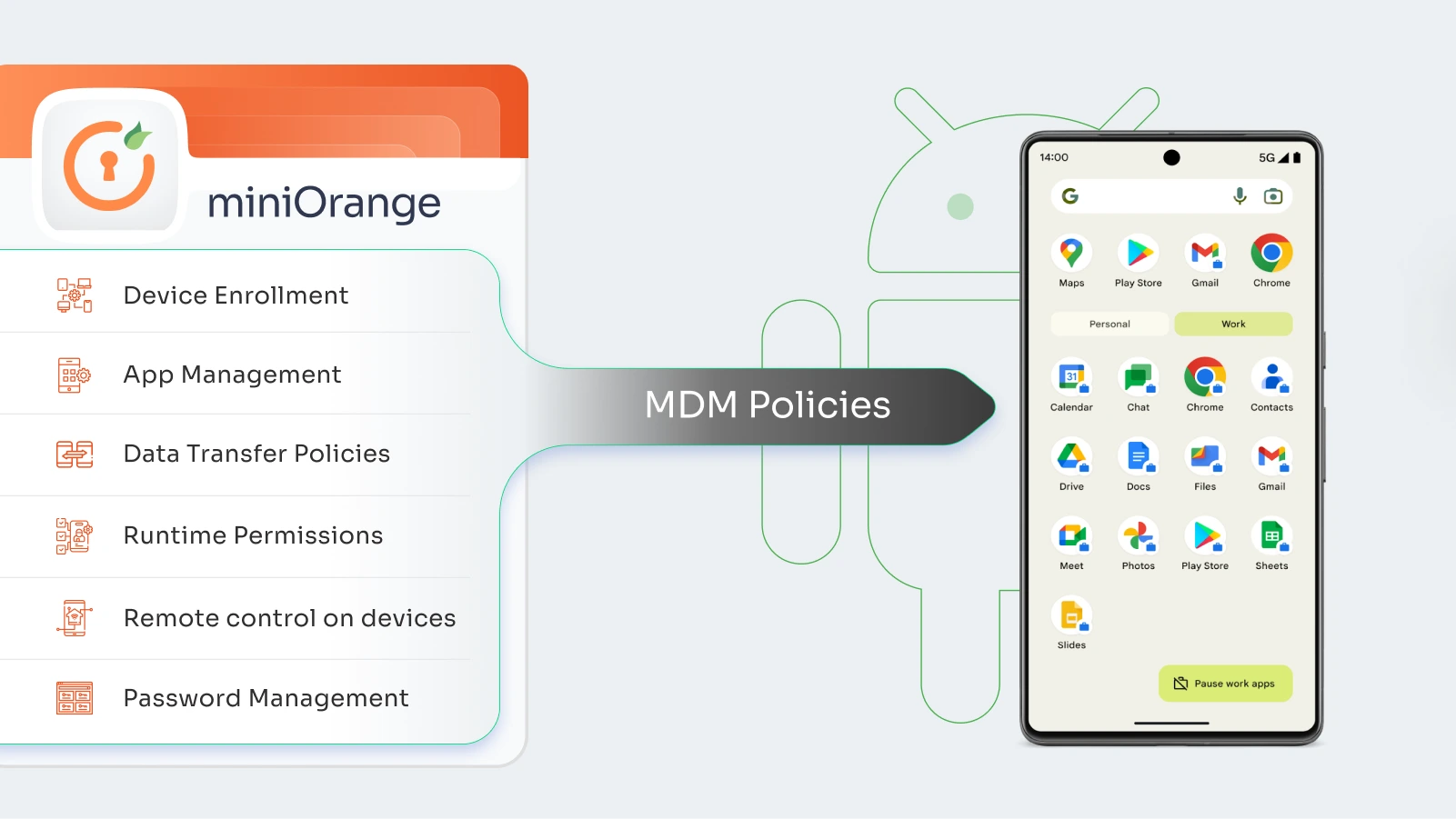A Quick Introduction
With the surge in remote work and BYOD (Bring Your Own Device) policies, securing corporate data across thousands of mobile endpoints has become a critical challenge. In fact, over 80% of small business owners rely on mobile devices for work daily (Zen Business), making mobile device security a critical aspect for businesses. To meet this requirement, businesses are opting for Mobile Device Management (MDM) software at scale.
In this blog, we’ll explore what MDM software is, highlight the top 5 MDM solutions of 2025, and guide you on choosing the right platform for your business needs.
What is MDM Software?
Mobile Device Management (MDM) software is a type of security and administration tool that allows organizations to control, secure, and enforce policies on mobile devices, whether corporate-owned or part of a BYOD environment.
At its core, MDM software helps IT teams remotely manage the entire device lifecycle: from onboarding and configuration to security enforcement and offboarding. It works by installing a lightweight agent or using APIs provided by mobile operating systems to establish a secure management channel.
Key functions of a mobile device management system include:
- Device Enrollment & Inventory: Automatically detect and register new devices.
- Policy Enforcement: Enforce security protocols like screen locks, encryption, and password strength.
- App Management: Install, update, or block apps remotely.
- Remote Actions: Lock, wipe, or locate lost/stolen devices instantly.
- Compliance Monitoring: Ensure devices meet corporate and regulatory standards.
Modern MDM tools are part of broader solutions like Unified Endpoint Management (UEM), integrating mobile, desktop, and IoT device control in one place. Whether for a startup or a global enterprise, MDM software is crucial to reduce IT overhead, improve endpoint visibility, and minimize security risks
Top 5 MDM Software Solutions in 2025
Choosing the right MDM tool can make all the difference in securing your mobile ecosystem. Below is a carefully researched list of MDM platforms that stand out in 2025—based on user reviews, feature strength, ease of use, and pricing transparency.
1. miniOrange – Best MDM Solution for Flexibility and Security

Why miniOrange MDM?
miniOrange offers a highly customizable Mobile Device Management (MDM) solution tailored for both small businesses and large enterprises. With strong multi-factor authentication, seamless integration with IAM tools, and granular policy enforcement, miniOrange stands out as the best MDM solution for organizations prioritizing identity-first security.
Key Features
- Device enrollment with role-based policies
- App blacklisting/whitelisting
- Location-based access control
- Remote wipe, lock, and restart
- Cross-platform support: Android, iOS, Windows
Pros
- Unified dashboard for managing all devices
- Built-in IAM integration
- Strong customer support and regular updates
Cons
- Limited marketplace integrations compared to larger players
Expert Take
With strong user reviews and a fast-growing customer base, miniOrange is gaining recognition as a powerful and scalable MDM software solution, especially for organizations already using identity and access management tools.
2. Microsoft Intune

Why Microsoft Intune?
As part of the Microsoft 365 ecosystem, Intune is a natural fit for businesses already invested in Microsoft services. It offers seamless device and app management across Windows, macOS, iOS, and Android.
Key Features
- Integration with Azure Active Directory
- App protection policies without device enrollment
- Conditional access and compliance settings
- Integration with Microsoft Defender
Pros
- Native integration with Microsoft 365
- Highly scalable for enterprise use
- Rich analytics and reporting tools
Cons
- Can be complex to configure initially
- Higher cost for standalone users
3. IBM MaaS360

Why IBM MaaS360?
IBM MaaS360 brings AI-powered insights through Watson integration, offering advanced threat management and contextual analytics, making it a great fit for highly regulated industries.
Key Features
- AI-driven threat intelligence
- Unified Endpoint Management (UEM) support
- Secure document sharing and containerization
- Integration with existing identity providers
Pros
- Strong analytics capabilities
- Industry compliance features
- Supports BYOD and corporate devices
Cons
- Slightly dated UI
- Premium features are locked behind higher tiers
4. SOTI MobiControl
![]()
Why SOTI?
SOTI specializes in managing rugged devices, point-of-sale systems, and field equipment—ideal for logistics, healthcare, and retail sectors.
Key Features
- Real-time remote control for troubleshooting
- Support for non-traditional endpoints (e.g. barcode scanners)
- Custom scripting for automation
- Geofencing and app lockdown features
Pros
- Excellent for IoT and rugged devices
- Strong support for Android Enterprise
- Secure kiosk mode
Cons
- Learning curve for advanced configuration
- UI not as intuitive as competitors
5. ManageEngine Mobile Device Manager Plus

Why ManageEngine?
Trusted by over 180,000 organizations globally, ManageEngine offers a comprehensive and budget-friendly MDM platform that works well for both cloud and on-premises setups.
Key Features
- Device provisioning and automated workflows
- App management and remote troubleshooting
- Content distribution and document sharing
- Location tracking and geo-fencing
Pros
- Free edition available for up to 25 devices
- Cloud and on-premise versions
- Easy to set up and use
Cons
- Lacks some advanced analytics
- Limited integrations with third-party apps
How to Choose the Best Mobile Device Management Platform
With so many mobile device management providers offering feature-rich platforms, finding the right MDM solution comes down to understanding your organization's specific needs. Here’s a framework to help you evaluate and compare the best-fit MDM software:
1. Understand Your Device Ecosystem
Do your employees use corporate-owned or BYOD devices? Are they on Android, iOS, Windows, or a mix? The best MDM tools support cross-platform management and offer flexibility in deployment, cloud-based, on-premises, or hybrid.
2. Prioritize Security & Compliance
Look for MDM platforms that offer strong encryption, remote wipe, conditional access, and compliance tracking (HIPAA, GDPR, etc.). This is critical for healthcare, finance, and government sectors.
Expert Tip: Solutions like miniOrange and IBM MaaS360 are known for their compliance-centric features.
3. Ease of Use and Deployment
Choose an MDM that provides a simple onboarding experience, pre-built policies, and an intuitive dashboard. Overly complex systems can slow down implementation and frustrate IT admins.
4. Scalability & Automation
If you're planning to grow, pick a solution that can scale with your business. Look for automation features like bulk device enrollment, policy assignment based on roles, and scheduled compliance checks.
5. Transparent Pricing and Support
Some MDM providers charge per device, others per user. Understand your billing model and what support is included— device OS, add-on features, customer support, etc.
Fact that Matters: According to a report by MarketsandMarkets, the global MDM market is projected to grow from $15.75 billion in 20 to $81.72 billion by 2032, emphasizing the long-term value of investing in a scalable MDM platform.
Conclusion
In today’s distributed and mobile-first world, relying on manual device management is no longer viable. The right mobile device management software not only secures endpoints but also simplifies IT operations, enforces compliance, and boosts user productivity.
Whether you're a small business looking for a flexible solution like miniOrange, or an enterprise in need of a robust ecosystem like Microsoft Intune or IBM MaaS360, this list of MDM solutions highlights the most trusted and scalable platforms of 2025.
Before choosing an MDM tool, evaluate your environment, security needs, and growth goals. Investing in the best MDM solution now can save you time, money, and security risks down the line.
contact us at uemsupport@xecurity.com to grab a customized solution for your unique business use case.





Leave a Comment